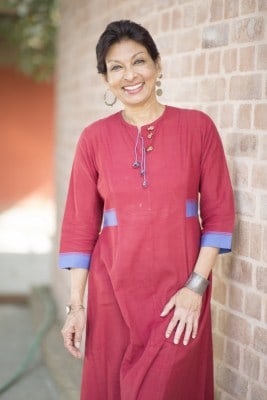By Sukant Deepak
New Delhi, Jan 13 : The lockdown might have proven to be a bizarre time for her considering she has not been home or in any one place for this long since she was 14-year-old. However, the suffocation did not stop Mallika Sarabhai – dancer, actor and social activist (“they are all part of me and make up the whole me”) and her artistic director at Darpana Academy of Performing Arts in Ahmedabad from conceiving a dance piece titled ‘Unblocked’ involving multiple dancers of diverse genres and generations, and putting it to Tapan Bose’s track ‘Rivulets of Innocence’.
“That was great fun. We have also been working on one of my solo one woman shows — ‘In Search of the Goddess’, and re-conceived it as a piece for the digital medium. Some extracts have been shown, and it will be released in its entirety soon,” Sarabhai told IANS.
The artist, who recently spoke during ‘Artist to Entrepreneur 2.0’, an initiative by Kolkata Centre for Creativity (KCC) has also written a book to be published by Speaking Tiger soon. She added, “I got the debilitating chikungunya recently, and still far from normal after nearly four months. I have never known such acute pain nor a body that refuses to do anything or move at all. The book is on my rather incredible journey finding health and wellness.”
Sarabhai, who hit international headlines when she played the character of Draupadi in Peter Brook’s nine-hour theatre production ‘Mahabharata’, which boasted of a diverse international cast admits that it changed the course of her life and work. “When I started out, I was a dancer and someone fighting for justice in my personal capacity. The experience of working with Brook, plumbing to my own depths, fighting for the Draupadi I believed in, seeing audiences react to my interpretation of her – all this meant that I came out wanting to use my performance for change, and all my subsequent work has been that.”
Talk to her about her solo theatrical works ‘Shakti: The Power of Women’, in which one sees the coming together of different art forms, and Sarabhai said, “Coming out of the ‘Mahabharata’, I knew I had to tell different stories, talk of things that I needed to talk about to sensitize people against prejudice and ignorance . I tried speaking to writers about it, hoping someone would understand where I wanted to go and write me a script. No one did. My friend John Martin convinced me to create it myself. Each woman’s story required to be told differently. I learnt Kalari for Rani of Jhansi, chose Kathakali for Mira, because that has a different kind of groundedness.
And how could Mira not sing? I was very diffident about this in spite of having learned vocal music for years and had to coax myself to have the courage to do so. I told myself that it was not important if people thought I had a great voice or not. I knew I could sing in sur. And who knows if Mira was a good singer? It was a huge breakthrough for me to be able to do it. All the stories could not be told through dance, without words. So, I used or learned what was necessary, throwing caution to the winds.”
As the conversation shifts to her performance ‘Sita’s Daughters’ which was made compulsory viewing for close to five years for SAARC Supreme Court judges as part of their sensitization, and Sharad Pawar, when he was CM, made it mandatory for every DM and SDM to watch it, Sarabhai, who has always stressed on the need for gender sensitivity training for public officials including police personnel, lawyers and journalists, said, “The need is much greater today. Men in and out of power need to be able to dissociate their worry about ‘being a man’ and their many insecurities and fear of losing power, and for this they need to be sensitized that they are first and foremost humans and only then men or women. They must understand that the fear of loss of control also leads to their own shackling, that they are not free to be and feel, they are afraid of being laughed at. They are prisoners of what society wants them to be. Just look at the way domestic violence victims and those of rape are treated by the police and courts today. There are judges who think a rape can be vindicated by the rapist accepting to marry the survivor. We must be the most misogynist society in the world – even more so than countries like Saudi Arabia.”
Lamenting that the arts have always been in a ‘poor’ state since the break down of the maharajas and temple patronage, Sarabhai feels that the formation of the Ministry of Culture, later the zonal centers with huge budgets, then the Academies – all of these have been reduced to personal favours and patronage of a particular individual to a favoured artist.
“CSR was supposed to be the saviour but that too has turned into a damp squid. All of us survived the last year because of access to the arts – whether it was the wretched migrant holding music to her ears through her barely charged phone, to those stuck to Netflix or to other platforms. And yet no one is willing to fund us. There are artists reduced to breaking stones in quarries, others begging. And I refer to all the ancillaries as well, the instrument makers, those who provide ghunghrus and cymbals, and saris for costumes. Wiser governments have given grants to artists to reinvent and survive the year. The insensitivity to the arts here is abysmal. We need to rethink the model or perish leaving India with Bollywood.”
–IANS
sukant/rt

